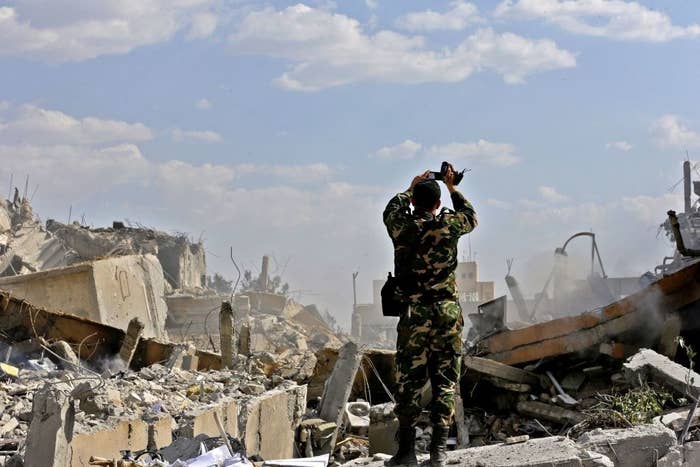
Weapons inspectors have entered the site where a suspected chemical weapons attack killed dozens of people in Syria this month, Russia's foreign ministry has said.
A team from the Organization for the Prohibition of Chemical Weapons (OPCW) reached Douma on Saturday, two weeks after the alleged use of chlorine gas on civilians by the Syrian government.
More than 70 people were killed and 500 injured on April 7, according to the World Health Organization, prompting coordinated strikes from the US, UK, and France last week.
The visit comes after a series of delays. The nine-strong team had to hold an attempt to assess the site after reports of gunfire while a UN security team carried out reconnaissance last week, according to Reuters.
Ahmet Üzümcü, director-general of the OPCW said at an earlier meeting of its council on April 16 that inspectors on a fact-finding mission were unable to begin their work because they had not been allowed access. The OPCW said it was unable to comment further for operational reasons.
Russia cited security concerns for the delay, claiming the inspection team lacked the required UN clearance.
But a spokesperson for the UN told Reuters that this was not the case and that the OPCW did not require security clearance.
"The United Nations has provided the necessary clearances for the OPCW team to go about its work in Douma. We have not denied the team any request for it to go to Douma," they said.
British prime minister Theresa May said there were "clearly attempts" by Syria and Russia to block any proper investigation into the attack.
"Even if the OPCW team is able to visit Douma to gather information to make that assessment – and they are currently being prevented from doing so by the regime and the Russians – it cannot attribute responsibility," she told MPs.
"This is because Russia vetoed in November 2017 an extension of the joint investigatory mechanism set up to do this. And last week, in the wake of the Douma attack, it again vetoed a new UNSC [United Nations Security Council] resolution to re-establish such a mechanism."
Labour leader Jeremy Corbyn also said it was "vitally important" for the OPCW inspectors to be allowed access to the site. But he criticised May for ordering the RAF to join US and French air strikes following the suspected attack.
"The Prime Minister is accountable to this parliament, not to the whims of the US president," he said. "We clearly need a War Powers Act in this country to transform a now broken convention into a legal obligation."
At the same meeting of the OPCW council on April 16, US ambassador Kenneth Ward expressed concern that the Douma site may have been tampered with and said it was the understanding of US officials that Russian forces had recently visited the site.
"We are concerned that they may have tampered with it with the intention of thwarting the efforts of the OPCW fact-finding mission to conduct an effective investigation," he said.
"This raises serious questions about the ability of the FFM to do its job."
US Ambassador expresses concern Russia may have visited attack site with intent of ‘thwarting’ @OPCW fact-finding mission #Douma #Syria https://t.co/HcZ7dcYYJD
Petter Lycke, Sweden's representative at the OPCW council, said the director-general told the meeting that Russia and Syria couldn't guarantee the safety of the investigations team on the ground.
The DG of #OPCW has updated the members of the EC @OPCW special meeting on Douma on the mission to Syria. According to Syria and Russia, security on the ground cannot be guaranteed & the FFM team has not yet been able to reach Douma. Full access to the site must now be granted.
Both Russia and Syria had called for the OPCW to investigate claims that chemical weapons were used at Douma, having strongly denied the allegations and described the incident variously as a Western-backed plot or a propaganda ruse from rebel forces opposed to the Assad regime.
The Russian embassy in the Netherlands said that the country would not seek to interfere in the OPCW's work.
Live from the @OPCW: the US tries to undermine the credibility the Fact-finding mission in Syria 🇸🇾 even before it arrives at Douma. Russia 🇷🇺 confirms its commitment to ensure safe and security of the mission and will not interfere in its work. https://t.co/XFQ5x9anj5
The UK's representative to the OPCW, Peter Wilson, said in his address to the council that his government was in no doubt that the Syrian regime was behind the attack.
And he expressed concern that Russia has repeatedly used its veto as a permanent member of the UN Security Council to block investigations into Syria's use of chemical weapons.
"We and international partners have sought time and again to prevent the Assad regime from using chemical weapons against the Syrian people," he said.
"Time and again when we have seen chemical weapons used in Syria, Russia has vetoed resolutions at the UN Security Council. Russia has vetoed six chemical weapons–related resolutions since the start of 2017, including a veto just last week of a draft resolution that would have established an independent investigation into the attack on Douma.
"Failure to act to hold perpetrators to account will only risk further barbaric use of chemical weapons, in Syria and beyond."
Wilson referred to the allegation that the UK was somehow behind the Douma attack as "ludicrous".


